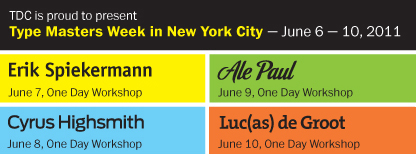Design
Events
Posted By:
Irina Lee
Friday 6 May 2011

What makes a good typeface? — Erik Spiekermann, June 7
I get asked this question a lot. My answer is always fairly vague: there’s history, fashion, technology, experience, users to consider. Most of these parameters are subjective. A few things, however, can be established by looking closer.
What is Bold as opposed to Medium? How much contrast makes a face Modern? How oblique is an Italic? I propose a workshop looking at objective parameters, e.g. measurements. We’ll pick what we consider relevant typefaces (that alone will be an interesting discussion) and proceed to establish some parameters that “good” typefaces have in common. Gathering those parameters (shape of serifs? relationship of x-height to caps? stroke width? etc) alone will be an eye-opener. As will be the methods to find them.
Obviously, this exercise is aimed at people who are looking for a way into type design, rather than experienced fontographers. We’ll be drawing as well as printing from our computers.
Class requirements: Paper, pencils, measuring devices (aka rulers). I work in metric, so this will also be a lesson in the metric system for US students.
Thinking in Contours — Cyrus Highsmith, June 8
Drawing with bézier curves or vectors can be frustrating, especially for the beginner. In this workshop, Cyrus Highsmith will share his tricks and strategies for drawing, editing, and thinking with the bézier drawing tools found in applications like FontLab and Adobe Illustrator. He will also explain his views on shape, contour, and letter drawing.
Class requirements: Typetool, FontLab or Adobe Illustrator
Lettering for the masses — Ale Paul, June 9
One place where we see some good hand lettering is the supermarket. Over there, hand lettering works best because if it’s good enough, nobody notices it. During this one-day workshop, we will explore some lettering used typographically, dig deep and discuss how lettering and typography can help brands acquire a unique popular personality or even hurt their popularity. We will play with ligatures, swashes and ink.
Class requirements: We don’t know if we’ll use your laptop at all but in case we have time we will use Adobe Illustrator, Fontlab (demo version is OK). You will need A3 sheets, pencils, sharpies, trace paper, brushes, bring everything you need to draw.
Optical mathematics — Luc(as) de Groot, June 10
Several lectures on eye opening topics, gestalt psychology in relation to letterforms, eye test, brain test, before and after examples. Hands on optimizing type in the context of logos.
Class requirements: Students should have Illustrator or any other outline drawing program on their laptop.
Fees and Deadlines
Early bird registration deadline Friday, May 6:
1 workshop : TDC members $275.00, Non members $350.00
4 workshops : TDC members $825.00, Non members $1,050.00 (come to all 4 workshops, only pay for only 3)
Registration after Friday, May 6:
1 workshop : TDC members $425.00, Non members $500.00
4 workshops : TDC members $1,275.00, Non members $1,500.00 (come to all 4 workshops, only pay for only 3
Type Masters Week in NYC Registration Page
Workshops are limited to 20 students. After 20 registrations, names will be added to a waiting list
Registering for a One Day Workshop will entitle the “student” to attend the entire lecture series for free.